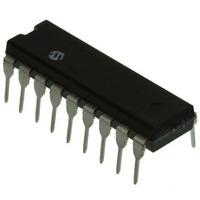PIC16F84-10/P Microchip Technology, PIC16F84-10/P Datasheet - Page 41

PIC16F84-10/P
Manufacturer Part Number
PIC16F84-10/P
Description
IC MCU FLASH 1KX14 EE 18DIP
Manufacturer
Microchip Technology
Series
PIC® 16Fr
Datasheets
1.PIC16F688T-ISL.pdf
(688 pages)
2.PIC16LF84A-04P.pdf
(125 pages)
3.PIC16LF84A-04P.pdf
(4 pages)
Specifications of PIC16F84-10/P
Program Memory Type
FLASH
Program Memory Size
1.75KB (1K x 14)
Package / Case
18-DIP (0.300", 7.62mm)
Core Processor
PIC
Core Size
8-Bit
Speed
10MHz
Peripherals
POR, WDT
Number Of I /o
13
Eeprom Size
64 x 8
Ram Size
68 x 8
Voltage - Supply (vcc/vdd)
4 V ~ 6 V
Oscillator Type
External
Operating Temperature
0°C ~ 70°C
Processor Series
PIC16F
Core
PIC
Data Bus Width
8 bit
Data Ram Size
68 B
Maximum Clock Frequency
10 MHz
Number Of Programmable I/os
13
Number Of Timers
1
Operating Supply Voltage
2 V to 6 V
Maximum Operating Temperature
+ 70 C
Mounting Style
Through Hole
3rd Party Development Tools
52715-96, 52716-328, 52717-734
Development Tools By Supplier
ICE2000
Minimum Operating Temperature
0 C
Lead Free Status / RoHS Status
Lead free / RoHS Compliant
For Use With
DVA16XP180 - ADAPTER DEVICE FOR MPLAB-ICEAC164010 - MODULE SKT PROMATEII DIP/SOIC
Data Converters
-
Connectivity
-
Lead Free Status / Rohs Status
Lead free / RoHS Compliant
Available stocks
Company
Part Number
Manufacturer
Quantity
Price
Company:
Part Number:
PIC16F84-10/P
Manufacturer:
MICROCHIP
Quantity:
4 499
Part Number:
PIC16F84-10/P
Manufacturer:
MIC
Quantity:
20 000
- Current page: 41 of 688
- Download datasheet (3Mb)
2.3.5
1997 Microchip Technology Inc.
External Crystal Oscillator Circuit for Device Clock
Sometimes more than one device needs to be clocked from a single crystal. Since Microchip
does not recommend connecting other logic to the PICmicro’s internal oscillator circuit, an exter-
nal crystal oscillator circuit is recommended. Each device will then have an external clock source,
and the number of devices that can be driven will depend on the buffer drive capability. This circuit
is also useful when more than one device (PICmicro) needs to operate synchronously to each
other.
Either a prepackaged oscillator can be used or a simple oscillator circuit with TTL gates can be
built. Prepackaged oscillators provide a wide operating range and better stability. A well-designed
crystal oscillator will provide good performance with TTL gates. Two types of crystal oscillator cir-
cuits can be used; one with series resonance, or one with parallel resonance.
Figure 2-4
designed to use the fundamental frequency of the crystal. The 74AS04 inverter performs the
180-degree phase shift that a parallel oscillator requires. The 4.7 k resistor provides the nega-
tive feedback for stability. The 10 k potentiometer biases the 74AS04 in the linear region.
Figure 2-4: External Parallel Resonant Crystal Oscillator Circuit
Figure 2-5
the fundamental frequency of the crystal. The inverter performs a 180-degree phase shift in a
series resonant oscillator circuit. The 330 k resistors provide the negative feedback to bias the
inverters in their linear region.
Figure 2-5: External Series Resonant Crystal Oscillator Circuit
When the device is clocked from an external clock source (as in
the microcontroller’s oscillator must be configured for LP, XT or HS mode
shows an external series resonant oscillator circuit. This circuit is also designed to use
shows implementation of an external parallel resonant oscillator circuit. The circuit is
74AS04
330 k
10 k
+5V
20 pF
10k
0.1 F
XTAL
74AS04
XTAL
4.7 k
Section 2. Oscillator
20 pF
74AS04
330 k
10 k
74AS04
74AS04
To Other
Devices
To Other
Devices
PIC16CXXX
CLKIN
Figure 2-4
PIC16CXXX
CLKIN
(Figure
DS31002A-page 2-11
or
Figure
2-3).
2-5) then
2
Related parts for PIC16F84-10/P
Image
Part Number
Description
Manufacturer
Datasheet
Request
R

Part Number:
Description:
Manufacturer:
Microchip Technology Inc.
Datasheet:

Part Number:
Description:
IC MCU FLASH 1KX14 EE 18DIP
Manufacturer:
Microchip Technology
Datasheet:

Part Number:
Description:
IC MCU FLASH 1KX14 EE 18SOIC
Manufacturer:
Microchip Technology
Datasheet:

Part Number:
Description:
IC MCU FLASH 1KX14 EE 18SOIC
Manufacturer:
Microchip Technology
Datasheet:

Part Number:
Description:
IC MCU FLASH 1KX14 EE 18DIP
Manufacturer:
Microchip Technology
Datasheet:

Part Number:
Description:
IC MCU FLASH 1KX14 EE 18DIP
Manufacturer:
Microchip Technology
Datasheet:

Part Number:
Description:
IC MCU FLASH 1KX14 EE 18SOIC
Manufacturer:
Microchip Technology
Datasheet:

Part Number:
Description:
IC MCU FLASH 1KX14 EE 18SOIC
Manufacturer:
Microchip Technology
Datasheet:

Part Number:
Description:
3.5KB Flash, 128B RAM, 18 I/O, CLC, CWG, DDS, 10-bit ADC 20 QFN 4x4mm TUBE
Manufacturer:
Microchip Technology
Datasheet:

Part Number:
Description:
3.5KB Flash, 128B RAM, 18 I/O, CLC, CWG, DDS, 10-bit ADC 20 PDIP .300in TUBE
Manufacturer:
Microchip Technology
Datasheet:

Part Number:
Description:
3.5KB Flash, 128B RAM, 18 I/O, CLC, CWG, DDS, 10-bit ADC 20 SOIC .300in TUBE
Manufacturer:
Microchip Technology
Datasheet:

Part Number:
Description:
3.5KB Flash, 128B RAM, 18 I/O, CLC, CWG, DDS, 10-bit ADC 20 SSOP .209in TUBE
Manufacturer:
Microchip Technology
Datasheet:

Part Number:
Description:
3.5KB Flash, 128B RAM, 18 I/O, CLC, CWG, DDS, 10-bit ADC 20 QFN 4x4mm TUBE
Manufacturer:
Microchip Technology
Datasheet:

Part Number:
Description:
3.5KB Flash, 128B RAM, 18 I/O, CLC, CWG, DDS, 10-bit ADC 20 PDIP .300in TUBE
Manufacturer:
Microchip Technology
Datasheet:

Part Number:
Description:
3.5KB Flash, 128B RAM, 18 I/O, CLC, CWG, DDS, 10-bit ADC 20 SOIC .300in TUBE
Manufacturer:
Microchip Technology
Datasheet:











